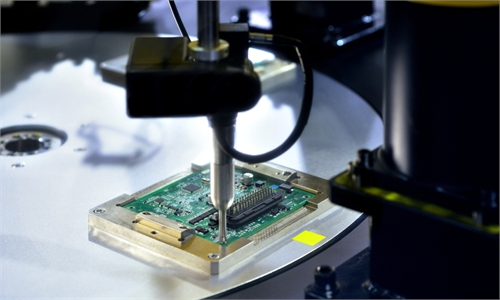
A new-energy vehicle (NEV) Illustration: VCG
China's Ministry of Industry and Information Technology (MIIT) on Wednesday issued draft industry standards on the comprehensive utilization of used new-energy vehicle (NEV) batteries to boost the development of the NEV sector.
As China's NEV industry has become a global leader, standard-setting for various segments of the industry is critical to ensure a sustainable high-quality development of the entire sector, especially amid crackdowns by some Western countries and regions, industry analysts said.
The draft standards were issued to strengthen management of the comprehensive utilization of used NEV batteries and promote the high-quality development of the industry, the MIIT said in a notice on Wednesday. Public feedback will be accepted until August 29.
The draft said that comprehensive utilization refers to the multi-level, multi-purpose utilization of used NEV batteries, including cascade utilization and recycling. Cascade utilization refers to the process of reusing discarded batteries in other areas after being tested, dissembled and reassembled, while recycling refers to the process of recycling metal elements in the batteries.
The draft includes different standards for different types of utilization, such as the conditions of factories, facilities and equipment as well as technical processes, traceability, resource utilization and energy consumption. For example, companies are being urged to use production facilities and equipment with a high degree of automation, low energy consumption, and advanced levels of environmental protection.
The draft includes specific requirements for recycling metals. For example, the recycling rates for copper and aluminum should be at least 98 percent, while the recycling rate for lithium during the smelting process should be at least 90 percent. For nickel, cobalt and manganese, the rate should be at least 98 percent, according to the draft.
This issue is critical as many countries are racing to gain access to metals that are crucial for making NEV batteries. As a global leader in the industry, China has a huge advantage in the utilization of used NEV batteries, which would further power the sustainable development of the country's NEV industry, analysts said.
"Setting clear standards for every link of the process is key to ensuring the sector's orderly development, preventing the outflow of resources and technologies, and preventing environmental pollution," Cui Dongshu, secretary-general of the China Passenger Car Association, told the Global Times on Wednesday.
Cui said that strengthening the management of the utilization of used NEV batteries is of great long-term significance for China's NEV industry, as it will help keep critical resources within the country.
Foreign media reports have noted that China is the world's leader in battery recycling, and the massive amount of used battery cells in the country could be a key advantage, if properly managed.
Given such massive potential, many Chinese localities and businesses are investing heavily in the reutilization of used NEV batteries. For example, Hefei, capital of East China's Anhui Province, which has become a major NEV production hub in China, is moving swiftly to bolster its NEV battery recycling industry.
As of the end of June, the city had constructed more than 40 recycling services centers, and its annual comprehensive utilization of used NEV batteries had reached about 10,000 tons, according to Anhui News.



